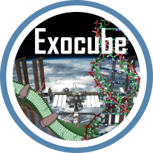Exocube
|
|
|
|
´The Exocube platform is designed to address important questions in Exobiology regarding the evolution and adaptation of life to space and planetary conditions. Biological processes and biomolecular mechanisms will be investigated at the interfaces between biology, chemistry, and physics. Outcomes from the Exocube project will have far-reaching implications for the interpretation of the results of past and upcoming planetary exploration missions. Exocube represents a new generation of space exposure platforms based on cubesat space mini-laboratories equipped with in-situ analytical instrumentation. Exocube will couple the capability of in-situ online monitoring of organism responses to the spaceflight environment in real time with detailed post-flight sample analyses on the ground. The immediate goals are to investigate (i) the response of life in different stages of complexity to space conditions and (ii) the role of membranes and membrane components as the interface between life and the physical environment. On Exocube, organisms with different structural complexity, from protocells to eukaryotic cells will be exposed to space radiation in low Earth orbit and microgravity, and their biological response will be measured in situ via reporter dyes. This, together with further sophisticated ground-based post-flight analysis, will allow us to study in detail the bio-molecular pathways triggered by radiation events and microgravity. It also will help to identify key molecules and membrane components that are involved in the adaptation of these organisms to space conditions. While leveraging existing proven astrobiology and astrochemistry in-situ technology from the O/OREOS satellite and the OREOcube experiment on the ISS, Exocube will implement advanced concepts such as UV-transmissive windows that expose organisms to a wider spectral range of radiation and a new miniaturized IR spectrometer to enable investigation of functional groups and their changes within relevant molecules. Outcomes from the Exocube project will support current and upcoming ESA/NASA planetary and space exploration missions (e.g. ExoMars, Mars2020, JUICE) by:
• Providing valuable data for open issues concerning the survival of organisms in space conditions. • Investigating photochemical processes of important biomolecules with relevance for the adaptation of life forms to space conditions as well as the origins of life. • Investigating the stability of primitive cell membrane constituents under space conditions. • Supporting planetary exploration by studying organisms used for life support systems and organic components with potential for radiation shielding applications.
Exocube was selected and is currently being implemented by the European Space Agency (ESA) for installation on the ISS in the 2020-2022 time frame. |
|
